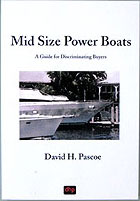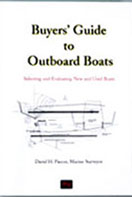Chapter 14
Excerpt
Surveying exhaust systems is one of the more critical aspects of completing the marine survey, not only because exhaust systems bear directly on the safety and seaworthiness of the vessel, but because surveyors so often encounter systems with either faulty designs or systems that utilize substandard materials.
The vast majority of boat builders today utilize good quality materials that are able to withstand the test of time, corrosion, heat and pressure.
Yet there are a sufficient number of builders that make either substandard or faulty systems that the surveyor should constantly be on the lookout for them.
Unlike most other types of vehicles, boats alone have exhaust systems that travel considerable distances inside the vessel. For this reason, faulty systems can threaten the vessel and its passengers with hazards of fire, sinking, engine damage and, worst of all, carbon monoxide poisoning. The following are the major design requirements:
? Contain and channel exhaust gasses safely from engine to an appropriate hull exit.
? Materials must be able to withstand constant immersion and be galvanically compatible.
? Materials and joints must be able to withstand internal pressurization.
? System design prevents water back surge into engine.
? System materials should be able to withstand short term overheating without suffering catastrophic failure.
? System design should not result in excessive exhaust back pressure that can cause engine damage.
The introduction of fiberglass pipe and mufflers has gone a long way toward eliminating most of the exhaust system problems of the past, which were directly related to the use of metallic components that were highly subject to the effects of various types of corrosion.
Rarely do we find metal mufflers, flanges and connectors in new boat construction, although they are occasionally found on custom or import boats.
The use of fiberglass pipe joined with sections of high temperature, reinforced exhaust hose known as "sleeve connectors" creates a rugged and highly reliable system which, depending on the quality of the exhaust hose, can last for decades. So, too, can fiberglass mufflers if they are well made.
The weakness of most systems is to be found in the manner in which it is designed and installed, and it is here that the surveyor must examine and evaluate the system with utmost care. But before we get into details of system design, lets first review some of the basic components and materials.
(Additional spaces are added for easy screen reading.)
Table of Contents: Chapter 14
14. Exhaust Systems 297
Materials 298
Fiberglass Pipe 298
Exhaust Hose 299
Stainless Steel 300
Cast Iron 300
Aluminum 301
Copper 301Mufflers 303
Tubular mufflers 303
Water Lift Mufflers 304
Bottle Mufflers 305
Back Pressure 305Exhaust Risers 306
Lagged Risers 307
Water-jacketed Risers 309
Jacketed Down-sweep Risers 310
Gas Engine Risers 310
Stainless Steel Risers 311
Large System Mounting 312
System Installation 314
Generator Exhaust Systems 315
The Carbon Monoxide Hazard 315
Back Surge Protection 317
Flappers 318
Underwater Exhausts 319
Hull Side Exhausts 320
Transom Attachments 321
Hose Clamps 321
 Surveying Fiberglass Power Boats
Surveying Fiberglass Power Boats - 2nd Edition
by David H. Pascoe
Soft Cover
480 pages
Publisher: D. H. Pascoe & Co., Inc.
Published: 2005
Language: English
ISBN-10: 0965649601
ISBN-13: 9780965649605
In Stock
HOME >
David Pascoe - Biography
David Pascoe is a second generation marine surveyor in his family who began his surveying career at age 16 as an apprentice in 1965 as the era of wooden boats was drawing to a close.
Certified by the National Association of Marine Surveyors in 1972, he has conducted over 5,000 pre purchase surveys in addition to having conducted hundreds of boating accident investigations, including fires, sinkings, hull failures and machinery failure analysis.
Over forty years of knowledge and experience are brought to bear in following books. David Pascoe is the author of:
- "Mid Size Power Boats" (2003)
- "Buyers’ Guide to Outboard Boats" (2002)
- "Surveying Fiberglass Power Boats" (2001, 2nd Edition - 2005)
- "Marine Investigations" (2004).
In addition to readers in the United States, boaters and boat industry professionals worldwide from over 70 countries have purchased David Pascoe's books, since introduction of his first book in 2001.
In 2012, David Pascoe has retired from marine surveying business at age 65.
On November 23rd, 2018, David Pascoe has passed away at age 71.





Normally orders ship the same day, if placed before 12:00 PM Eastern time.